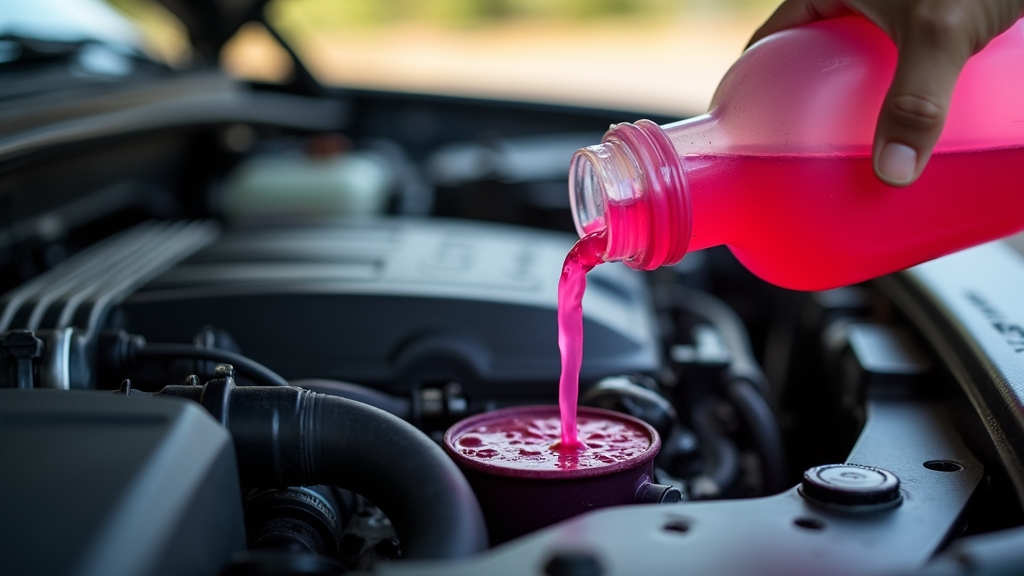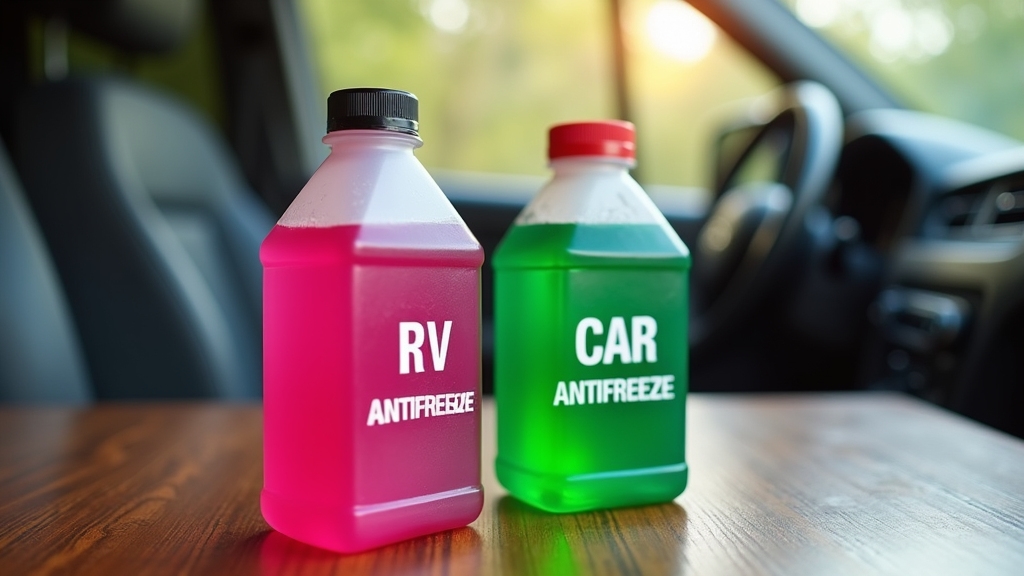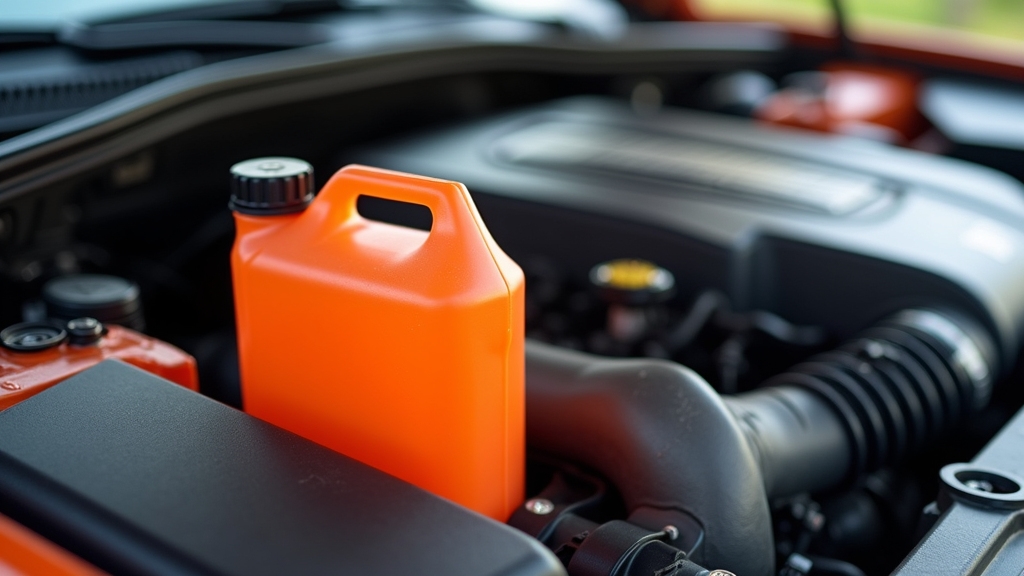Physical Address
304 North Cardinal St.
Dorchester Center, MA 02124
Physical Address
304 North Cardinal St.
Dorchester Center, MA 02124

You shouldn’t use RV antifreeze in your car because it’s formulated for low-pressure plumbing systems, not the high-temperature, high-pressure environment of automotive engines.
Its propylene glycol base and specific additives don’t provide the corrosion protection or heat transfer efficiency your engine cooling system needs.
Using it can cause damage like clogs, leaks, or corrosion. To protect your vehicle properly, it’s essential to choose antifreeze designed specifically for automotive use.
Discover why the differences matter for your engine’s health.

Although both RV and automotive antifreezes serve to prevent freezing and overheating, their chemical compositions differ considerably to meet distinct functional requirements.
RV antifreeze primarily uses propylene glycol or ethanol, which are non-toxic and food-grade, making them safe for potable water systems. In contrast, automotive antifreeze contains ethylene glycol, a toxic compound unsuitable for drinking water. These chemical differences also influence the corrosion resistance properties necessary for their respective systems.
RV formulations often blend propylene glycol, ethanol, and additives like potassium hydroxide and glycerol to enhance freeze protection and corrosion resistance. These additives focus on compatibility with plumbing materials, ensuring non-degradation of rubber seals and plastics. Propylene glycol is generally preferred for its safety and performance in extreme cold conditions.
Automotive antifreeze additives target engine component longevity under thermal stress. Additionally, RV antifreeze is biodegradable and environmentally safe, whereas automotive antifreeze requires careful disposal due to toxicity.
When you choose antifreeze, understanding its intended use is essential because RV antifreeze and automotive antifreeze serve fundamentally different functions.
RV antifreeze is formulated primarily to winterize water systems, preventing freezing and damage in pipes and tanks. In contrast, automotive antifreeze protects engine cooling systems under extreme thermal and mechanical stresses.
Note that automotive antifreeze is often a pre-blended, pre-charged extended life coolant designed for long-term corrosion protection. Additionally, automotive antifreeze contains specialized additive technology that enhances engine efficiency and longevity.
RV antifreeze safeguards water systems from freezing, while automotive antifreeze protects engines under intense heat and stress.
Consider these distinctions:
Since RV antifreeze and automotive antifreeze contain fundamentally different chemicals, using RV antifreeze in car engines raises significant safety and toxicity concerns.
Automotive antifreeze contains ethylene glycol, a highly toxic compound that can cause severe organ damage if ingested, requiring immediate medical intervention. Ethylene glycol antifreeze is toxic and not suitable for RV water systems; it is primarily used in automotive engines.
Note that automotive antifreeze formulations are designed to provide wear protection and optimal performance under high-temperature conditions specific to car engines.
RV antifreeze typically uses propylene glycol or ethanol, which are less toxic but still chemical hazards. While propylene glycol is safer, it can cause health issues in large quantities.
Ethanol-based formulas may degrade rubber seals. Proper selection of antifreeze prevents corrosion, component wear, and system disruption. You must handle RV antifreeze with care, avoiding ingestion, skin contact, and inhalation.
Additionally, improper storage risks accidental exposure, especially for children and pets. Environmentally, RV antifreeze is biodegradable and less harmful, but spills still require proper management.
Because RV antifreeze contains primarily propylene glycol rather than the ethylene glycol found in automotive antifreeze, it lacks the chemical formulation necessary for effective engine protection.
You should understand that RV antifreeze is designed for plumbing freeze protection, not the complex thermal and corrosion demands of car engines. Hydraulic oil and engine oil differ significantly in their operating temperature range, which highlights why RV antifreeze is unsuitable for engine cooling systems.
Key technical limitations include:
Additionally, RV antifreeze is formulated mostly for use in plumbing systems rather than high-performance engine cooling systems, which further limits its suitability for plumbing systems. These factors mean RV antifreeze can cause engine damage, reduced cooling efficiency, and premature component failure.

Although selecting antifreeze might seem straightforward, choosing the right type demands careful attention to your vehicle’s manufacturer specifications and compatibility requirements. Using the appropriate coolant formulation helps maintain optimal engine protection and performance.
You need to verify OEM recommendations for additive technologies (IAT, OAT, HOAT), freeze points, and color coding to guarantee corrosion protection.
Avoid mixing incompatible formulations, which risks sludge and engine damage, as mixing incompatible coolants can cause seal deterioration and corrosion issues.
| Antifreeze Type | Recommended Use |
|---|---|
| IAT (Green) | Older cast iron engines; 36,000 mi |
| OAT (Orange) | Modern aluminum engines; 150,000 mi |
| HOAT (Yellow) | Mixed-metal engines; balanced protection |
Adhere strictly to service intervals and manufacturer guidelines to maintain cooling performance and engine longevity. Proper maintenance ensures your engine runs smoothly and avoids costly repairs.
Yes, using RV antifreeze in your car’s radiator can damage it. RV antifreeze lacks essential corrosion inhibitors designed for engine metals, leading to accelerated rust and corrosion over time.
It also doesn’t provide adequate heat transfer, risking overheating. If you accidentally use it, you should flush the cooling system completely and refill it with proper automotive antifreeze to prevent long-term damage and maintain ideal engine performance.
You can identify RV antifreeze visually by its bright pink color, which is consistent due to propylene glycol formulation. Automotive antifreeze typically appears green but can also be orange or yellow, reflecting varied chemical additives.
RV antifreeze containers are labeled non-toxic and safe for potable water, while automotive antifreeze warns of toxicity and specifies engine use only. These color and labeling differences help you quickly distinguish between the two types.
No, you shouldn’t dispose of RV antifreeze down household drains. Despite its lower toxicity and biodegradability, it can still harm municipal water treatment systems, septic tanks, and groundwater.
Residual chemicals disrupt bacterial action essential for waste breakdown and may contaminate aquatic environments.
Instead, take RV antifreeze to designated hazardous waste facilities or approved recycling centers, conforming with local regulations to ensure safe, environmentally responsible disposal.
Yes, you can use RV antifreeze in boats and some motorcycles if it’s specifically labeled marine-grade or compatible with engine cooling systems. It protects freshwater plumbing and metal components from freezing and corrosion, thanks to propylene glycol.
However, verify the product meets ASTM or SAE standards for your vehicle type. Avoid using standard RV antifreeze in motorcycles unless the manufacturer approves it, as engine-specific formulations often provide better protection and longevity.
Improper RV antifreeze disposal contaminates soil and groundwater with toxic ethylene glycol, harming vegetation and disrupting ecosystems. You risk poisoning aquatic life, pets, and wildlife through toxic runoff.
Dumping antifreeze into sewers or storm drains impairs wastewater treatment and spreads pollution. This contamination can violate EPA regulations and cause costly remediation.
Always use proper disposal methods to prevent prolonged environmental damage and comply with hazardous waste management protocols.
You shouldn’t use RV antifreeze in your car because its chemical makeup isn’t designed for engine protection and can cause damage. For example, imagine driving with RV antifreeze that lacks the necessary corrosion inhibitors; over time, your engine’s cooling system could corrode, leading to costly repairs.
Always choose automotive antifreeze formulated for your vehicle to guarantee peak performance and safety. Using the right product prevents technical failures and protects your engine efficiently.